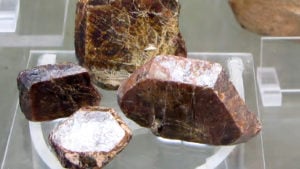Rare earth materials, also referred to as rare earth elements (REEs), are typically accepted as a group of 17 chemical elements. The list starts with 15 lanthanides from the lanthanide series on the periodic table, from lanthanum (La) to lutetium (Lu). Then we see scandium (Sc) and yttrium (Y). Although not technically a lanthanide, scandium is often grouped with REEs due to its similar geological occurrence and chemical properties. Finally, yttrium shares characteristics similar to the lanthanides as well.
One of the key challenges in the rare earth industry is the production and supply chain, which China has historically dominated. This dominance has led to concerns about supply chain security and sustainability. As a result, the U.S. and its allies are focusing on efforts to diversify production and reduce reliance on a single country. Here are three rare earth stocks to consider in the second quarter.
Albemarle (ALB)

We start our discussion of rare earth stocks with Albemarle (NYSE:ALB), a leader in lithium, a critical component in EV batteries €” the company mines and processes various chemicals, with lithium at the forefront. As a result, ALB stock has become a play on the booming EV industry and the rising demand for rare earth stocks.
In mid-February, Albemarle reported a full-year 2023 net sales increase of 31% to $9.6 billion, translating into a net income of $1.6 billion or adjusted diluted earnings per share (EPS) of $15.22. This growth was driven by a 21% total volume growth, with the Energy Storage segment sales volume increasing by 35%.
ALB stock has come under pressure after reaching an all-time high in the second half of 2022. So far in 2024, ALB stock is down by about 19%. Yet, the company’s fundamentals remain strong, boasting a diversified lithium product portfolio and a geographically robust production footprint.
Additionally, the company is working to secure long-term supply agreements with major automakers, ensuring consistent demand. For instance, in 2023, Ford Motor (NYSE:F) chose Albemarle to deliver battery-grade lithium hydroxide to support the automaker’s plans to scale EV production. The five-year supply agreement starts in 2026 and continues through 2030.
ALB shares change hands at 8.8 times trailing earnings and offer a dividend yield of 1.4%. Meanwhile, Wall Street remains positive on Albemarle. The 12-month median price forecast for ALB stock stands at $145, representing a potential upside of 24.06%.
MP Materials (MP)

If you are looking for another beneficiary of the EV revolution, then MP Materials (NYSE:MP) deserves your attention. The company produces rare earth magnets, a critical component in EV motors and recent government grants potentially position it well for future expansion. However, its high valuation and short-term financial performance warrant consideration before investing.
MP Materials released the fourth quarter and full year 2023 financials in early February. Both top and bottom line results were disappointing, as the company lost more than half its revenue on a quarterly and yearly basis compared to last year’s results. 2023 revenues dropped 52% to $253 million, and adjusted diluted EPS shrank 77% from $1.68 to 39 cents. Challenges in the pricing environment impacted the company’s financial performance. The realized price per REO metric ton (MT) decreased by 34%, and the production cost per REO MT increased by 24%.
Management suggested MP Materials faced market headwinds throughout 2023 but still exceeded 40,000 tons of rare earth oxide (REO) production for the third consecutive year. Meanwhile, it also achieved the first production and sales of Neodymium and Praseodymium (NdPr), utilized in high-strength permanent magnets.
As a result, the stock has lost about a fifth of its value year-to-date (YTD). However, analysts currently have a 12-month median price forecast of $22. Such a potential up move in MP stock would mean a price appreciation of over 37%.
VanEck Vectors Rare Earth/Strategic Metals ETF (REMX)

Our final discussion on rare earth metals focuses on a fund, namely the VanEck Vectors Rare Earth/Strategic Metals ETF (NYSEARCA:REMX), first listed in October 2010. Currently, the ETF offers a diverse portfolio of 27 global stocks. These businesses focus on the mining, refining and recycling of critical rare earth and strategic metals. Its total net assets stand at approximately $333 million.
The top 10 positions in REMX account for around 60% of the overall portfolio. Meanwhile, the fund’s geographical exposure spans Australia, the U.S., China, Canada and other countries.
Some of the prominent names in the REMX ETF include Albemarle, Pilbara Minerals (OTCMKTS:PILBF), Arcadium Lithium (NYSE:ALTM), Lynas Rare Earths (OTCMKTS:LYSDY) and Sociedad Quimica y Minera de Chile (NYSE:SQM). In addition, there are several businesses from China. They include China’s Northern Rare Earth Group High-Te, Jinduicheng Molybdenu and Xiamen Tungsten. These companies supply critical materials essential for high-tech applications, such as consumer electronics, EVs and aerospace.
Despite the strategic importance of these metals and minerals, the ETF has faced challenges in 2024, with a YTD decline of over 18%. As a result, REMX potentially offers investors a more attractive entry point to gain exposure to global rare earth stocks.
On the date of publication, Tezcan Gecgil did not have (either directly or indirectly) any positions in the securities mentioned in this article. The opinions expressed in this article are those of the writer, subject to the InvestorPlace.com Publishing Guidelines.
Tezcan Gecgil, PhD, began contributing to InvestorPlace in 2018. She brings over 20 years of experience in the U.S. and U.K. and has also completed all 3 levels of the Chartered Market Technician (CMT) examination. Publicly, she has contributed to investing.com and the U.K. website of The Motley Fool.
